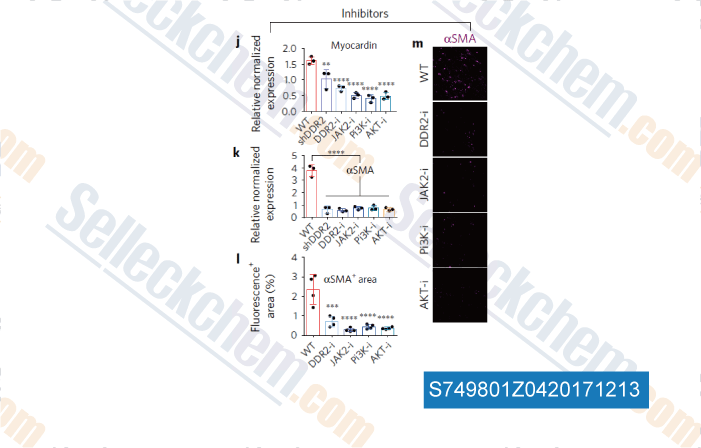|
Toll Free: (877) 796-6397 -- USA and Canada only -- |
Fax: +1-832-582-8590 Orders: +1-832-582-8158 |
Tech Support: +1-832-582-8158 Ext:3 Please provide your Order Number in the email. |
Technical Data
| Formula | C30H31F3N4O3 |
||||||||||||||
| Molecular Weight | 552.59 | CAS No. | 1449685-96-4 | ||||||||||||
| Solubility (25°C)* | In vitro | DMSO | 100 mg/mL (180.96 mM) | ||||||||||||
| Ethanol | 6 mg/mL (10.85 mM) | ||||||||||||||
| Water | Insoluble | ||||||||||||||
| In vivo (Add solvents to the product individually and in order) |
|
||||||||||||||
|
* <1 mg/ml means slightly soluble or insoluble. * Please note that Selleck tests the solubility of all compounds in-house, and the actual solubility may differ slightly from published values. This is normal and is due to slight batch-to-batch variations. * Room temperature shipping (Stability testing shows this product can be shipped without any cooling measures.) |
|||||||||||||||
Preparing Stock Solutions
Biological Activity
| Description | DDR1-IN-1 is a potent and selective discoidin domain receptor 1 (DDR1) receptor tyrosine kinase inhibitor with IC50 of 105 nM, about 3-fold selectivity over DDR2. | ||||
|---|---|---|---|---|---|
| Targets |
|
||||
| In vitro | In U2OS cells, DDR1-IN-1 inhibits basal DDR1 autophosphorylation with EC50 of 86 nM, and demonstrates stronger inhibition of DDR1 autophosphorylation in the absence of collagen stimulation. In a panel of different cancer cell lines that possess DDR1 gain-of-function mutations and/or overexpression, DDR1-IN-1, dose not inhibit proliferation below a concentration of 10 μM, while GSK2126458 potentiates the antiproliferative activity of DDR1-IN-1. [1] |
Protocol (from reference)
| Kinase Assay: |
|
|---|---|
| Cell Assay: |
|
Customer Product Validation

-
Data from [Data independently produced by , , Nature Materials, 2017, 16:1252-1261.]
Selleck's DDR1-IN-1 has been cited by 9 publications
| Multiplex single-cell chemical genomics reveals the kinase dependence of the response to targeted therapy [ Cell Genom, 2024, 4(2):100487] | PubMed: 38278156 |
| MiR-4458-loaded gelatin nanospheres target COL11A1 for DDR2/SRC signaling pathway inactivation to suppress the progression of estrogen receptor-positive breast cancer [ Biomater Sci, 2022, 10.1039/d2bm00543c] | PubMed: 35792605 |
| Targeting Discoidin Domain Receptors DDR1 and DDR2 overcomes matrix-mediated tumor cell adaptation and tolerance to BRAF-targeted therapy in melanoma [ EMBO Mol Med, 2021, e11814] | PubMed: 34957688 |
| Crosstalk between invadopodia and the extracellular matrix [ Eur J Cell Biol, 2020, 99(7):151122] | PubMed: 33070041 |
| Collagen-rich airway smooth muscle cells are a metastatic niche for tumor colonization in the lung [ Nat Commun, 2019, 10(1):2131] | PubMed: 31086186 |
| Discoidin domain receptors: A promising target in melanoma. [ Pigment Cell Melanoma Res, 2019, 32(5):697-707] | PubMed: 31271515 |
| [ Cell Death Dis, 2018, ] | PubMed: 29988031 |
| Mechanotransduction-modulated fibrotic microniches reveal the contribution of angiogenesis in liver fibrosis. [ Nat Mater, 2017, 16(12):1252-1261] | PubMed: 29170554 |
| Mechanotransduction-modulated fibrotic microniches reveal the contribution of angiogenesis in liver fibrosis. [Longwei Liu, et al. NAT MATER, 2017, 10.1038/NMAT5024] |
RETURN POLICY
Selleck Chemical’s Unconditional Return Policy ensures a smooth online shopping experience for our customers. If you are in any way unsatisfied with your purchase, you may return any item(s) within 7 days of receiving it. In the event of product quality issues, either protocol related or product related problems, you may return any item(s) within 365 days from the original purchase date. Please follow the instructions below when returning products.
SHIPPING AND STORAGE
Selleck products are transported at room temperature. If you receive the product at room temperature, please rest assured, the Selleck Quality Inspection Department has conducted experiments to verify that the normal temperature placement of one month will not affect the biological activity of powder products. After collecting, please store the product according to the requirements described in the datasheet. Most Selleck products are stable under the recommended conditions.
NOT FOR HUMAN, VETERINARY DIAGNOSTIC OR THERAPEUTIC USE.
